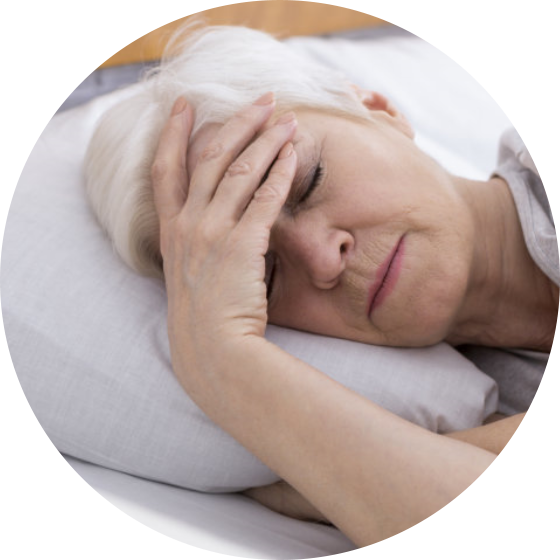Menopause and Sleep
Last updated: December 2020
Home > Information & Support > Adults > Sleep Hub >What is menopause?
The menopause is a natural process for women as they age. It usually occurs between the ages of 45-55 as women stop producing the usual amount of the females hormones: oestrogen and progesterone. Consequently, a woman stops having periods and is no longer able to get pregnant naturally.
It is this change in hormone levels that causes the symptoms of the menopause. Most women will experience menopausal symptoms that can affect everyday life including:
- hot flushes and night sweats
- difficulty sleeping
- low mood or anxiety
- vaginal dryness and discomfort during sex
- reduced sex drive (libido)
- problems with memory and concentration
- anxiety
- irritability
- weight gain
- headaches
- hair loss
- overactive bladder/urinary incontinence

How does menopause affect sleep?
Changes in hormone levels as we age can cause sleep disturbances, and sleep disturbances can alter hormone levels, turning into a vicious cycle.
Sleeplessness can affect around 10 different hormones and shifts in these hormones can cause changes in appetite, mental wellbeing, cardiac health and even fertility.
Menopause and insomnia
Many people will experience bouts of insomnia from time to time, but menopause-related insomnia can stretch on for weeks and months if not properly treated.
Insomnia is generally an inability to fall asleep or persistent wakening’s for a period of over three months. Menopause can be a key trigger of insomnia because of some of the physiological and psychological changes women experience when going through the menopause.
Given perimenopause (pre-menopause) typically starts in a woman’s 40s (but can start in her 30s or even earlier) and menopause itself isn’t until around the age of 50, the entire process can last anywhere between 2-10 years. Consequently, the effects of menopause on sleep can be chronic and life debilitating given the longevity of the menopause process.
In peri- and post-menopause, many women have trouble getting to sleep and staying asleep. This can be accompanied by hot flushes (due to fluctuations in oestrogen and progesterone levels) which can cause more awakenings, restless legs syndrome (a nervous condition with an overwhelming irresistible urge to move the legs) and sleep disordered breathing such as obstructive sleep apnoea.
Not getting enough good sleep can affect all areas of life and sleep issues are often accompanied with low mood and anxiety.
How to sleep better during menopause
- Maintain a regular sleep pattern and ensure there is sufficient time to wind down before bed
- Keep a cool temperature in the bedroom and use light, cotton bed linen and/or nightwear
- Try not to raise body temperature before bed so steer clear of large, late night meals and spicy food
- Eat a healthy balanced diet
- Exercise regularly
- Give up smoking and avoid alcohol
- Practice relaxation techniques, mediation or mindfulness to help reduce stress and worry
- See your GP for advice and further treatment such as hormone replacement therapy if insomnia continues, and impacts significantly in your daily life.
Menopause and sleep
Download full colour or print-friendly advice sheet
